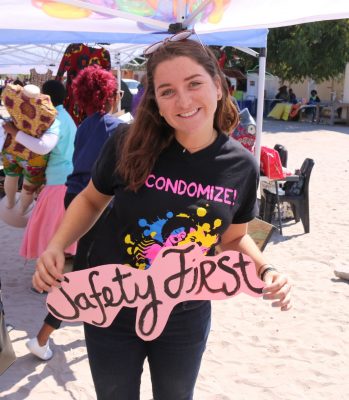Q&A with Lucy Ruderman, MPH Candidate, FHI 360 Public Health Research Fellow

Lucy Ruderman working with BOFWA to conduct community education and awareness as part of #KECHMMO, a condom social marketing campaign based in Maun, Botswana
What was your background before enrolling in the MPH program?
I’ve always dubbed myself a ‘public health person.’ I studied Global Health in my undergrad at University of Southern California and then joined the Peace Corps as an HIV/AIDS Civil Society Capacity Building volunteer in Botswana. There, I worked with the International Planned Parenthood Federation affiliate organization, Botswana Family Welfare Association (BOFWA), on adolescent sexual and reproductive health programming, condom social marketing, and a community-based HIV testing and treatment project. After 2.5 years in Maun, Botswana, I moved to Port Moresby, Papua New Guinea (PNG) where I worked with the United Nations Population Fund (UNFPA) on the Spotlight Initiative to End Violence Against Women and Girls. Specifically, I worked on comprehensive sexuality education and youth engagement activities within the Spotlight portfolio. Like the rest of the world, my role shifted when COVID-19 hit, and I was tasked as the coordinator for the Gender-Based Violence Sub-Cluster, a stakeholder working group activated by the UN with the aim of monitoring and addressing PNG’s domestic violence response needs amidst COVID-19 lockdowns.
Will you tell us more about your MPH practicum as an FHI 360 Public Health Research Fellow?
I am dually placed within the Reproductive Maternal Neonatal and Child Health Division (RMNCH) and the Research for Scalable Solutions project (R4S). During my practicum, I got to work with RMNCH on an exciting contraception innovation project to test new messaging for providers to counsel users on self-injectable contraception (DMPA-SC). My role revolved around data strengthening—corroborating monitoring data with challenges in the field—and qualitative analysis where I drafted a manuscript about men’s perspectives on self-injection. With R4S, I took a deep dive into how the world measures equity, studying other sectors like education and agriculture, and made recommendations for how we can properly measure equity in global family planning. For this project, I got to work with stakeholders at both the global and country levels, including partners in Uganda, Niger, and Malawi.
What is your favorite part of working with your team within FHI 360?
My favorite part of working at FHI 360 is the fact that I’m surrounded by such talented and intelligent people all the time. I’m always energized by their creativity and tenacity—willing to tackle even the toughest of problems. Another thing I’ve loved is that people are genuinely excited to work with me. Team members have taken the time to get to know me, my skills, and the areas I’d like to grow in, which not only makes me feel valued but pushes me to be the best public health professional possible.
What does “global health” mean to you?
To me, global health means that all people, no matter who they are or where they are from, have full opportunity to live out their potential. Whether that is through preventative health measures, treatment and care, or socioeconomic equity and justice, I believe everyone should be able to reach their goals unhindered.
What drew you to the Gillings School of Global Public Health?
When I was researching different MPH programs, I got the chance to speak with Dr. Suzanne Maman. One thing that stuck with me was her saying some schools are research institutions that teach but Gillings is a teaching institution that does research. Meaning, Gillings would allow me to have the rich research and practice opportunities of any top public health institution, but also the Department of Health Behavior would give me the mentorship and skills-learning that I was searching for in a master’s degree program. This has definitely come to fruition while being at Gillings and I’m so glad I made the decision to study public health here.
What is your dream job?
Non-public health? Food Critic for sure. I love trying new foods and exploring restaurants wherever I’m living or visiting. The other thing I’ve always joked about doing in retirement is opening a cheese shop. Basically, anything having to do with food. But I’d say a career in public health is a close second.
Where do you feel the most at home?
Over the past 10 years I’ve moved around so much that it’s hard to say where I feel most at home. Everywhere and nowhere at the same time? I will say that the start of fall is making me wish I was in Chicago, where I grew up, because it’s so beautiful this time of year and there’s nothing like crisp autumn air.
